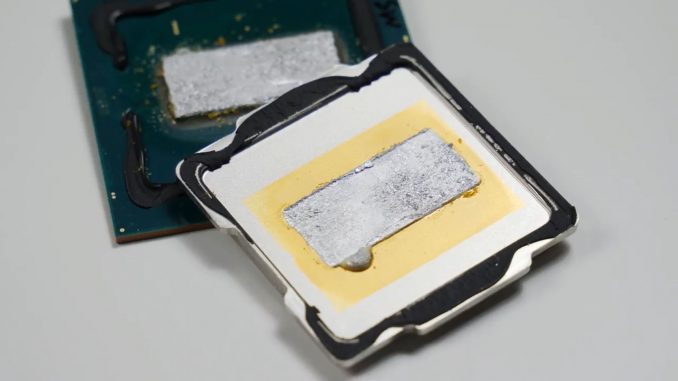
The new Intel Core i9-9900K is soldered, but there is still a lot of heat generated. der8auer has now delidded several processors and tried to optimize them.
i9-9900K: bad heat dissipation even with solder?
Ahead of the i9-9900K launch, there were already some indications that Intel will be soldering the ninth-generation processors. In the previous generations, the processor manufacturer used the so-called Thermal Interface Material (TIM), a heat-conducting paste, instead of an indium solder. This is located between the actual processor and the heatspreader. However, the thermal conductivity of the TIM was extremely poor. Therefore it was common practice with the last Intel generations to delidd the processor and replace the heat conducting paste with liquid metal. This brings a temperature advantage of up to 20 degrees Celsius.
With the i9-9900K, Intel started soldering the processors again. Both the K models of the Coffee Lake Refresh series and the Skylake-X Refresh models are now again featuring an indium solder instead of the TIM. Intel calls the layer Solder Thermal Interface Material (STIM). However, the first tests of the i9-9900K show that the processor gets very warm despite the solder. So there was the suspicion that Intel didn’t use the same soldering method as in the previous generations. The extreme overclocker Roman der8auer Hartung has now delidded some processors and tried to optimize them
Thicker chip provides more heat
Hartung talks about many technical details of the processor. The extreme overclocker first headed the i9-9900K with the self-developed tool Delid Die Mate 2. He noticed that the indium layer is relatively thick. Hartung then tried to solder the processor again to reduce the layer thickness by removing the silicone glue, which worked well so far. However, the spreading didn’t seem to work entirely, which is why individual cores became clearly too warm.
der8auer then delidded the processor and completely removed the indium solder with a knife and sandpaper. He also delidded an i5-9600K, which has the same chip as the i9-9900K, and measured it afterwards. The 178 mm² chip is significantly larger in relation to the smaller i7-8700K. The predecessor measures only 153 mm². The thickness of the chip has increased significantly too. While the 8700K was 0.42 mm thick, the Coffee Lake Refresh chip is more than twice as thick measuring 0.87 mm. The processor board is also significantly thicker than its predecessor, but this makes no difference in terms of temperature. However, the thick silicon chip does not conduct as well as the copper of the heatspreader, which is why the temperature rises.
Delidding brings 9 degrees better results
After the measurements, Hartung started to optimize the CPUs. In the first step, he sealed the already decapitated i9-9900K with liquid metal. Temperatures dropped from 93 degrees Celsius to 84 degrees Celsius at 4.8 GHz on all cores. der8auer then tested the i5-9600K in another way. The relatively thick chip is a problem for the heat dissipation, which is why Hartung ground it down by 0.15 mm and in a second step by a further 0.05 mm. The i5-9600K overclocked to 5 GHz reached 96.5 degrees Celsius without any changes in a Prime95 test. Delidded and equipped with Thermal Grizzly Conductonaut, the temperature dropped to 88.5 degrees Celsius. Grinding brought further improvements, initially to 84.66 degrees Celsius. With a total of 0.20 mm less silicium, the i5-9600K reached 83 degrees Celsius, which means an improvement of 13.5 degrees Celsius.
der8auer processors are coming already delidded
Roman Hartung could not find out why Intel increased the thickness of the chips so much, even with the help from his industrial sources. However, it is certain that the thicker chip and the thicker indium layer actually have a negative effect on the heat dissipation of the Coffee Lake Refresh processors. Delidding is difficult for private users, but still feasible. Hartung also gives an insight into the upcoming Special Edition processors in cooperation with Caseking. These will be already delidded and equipped with liquid metal even though the process will be more complex.

Be the first to comment